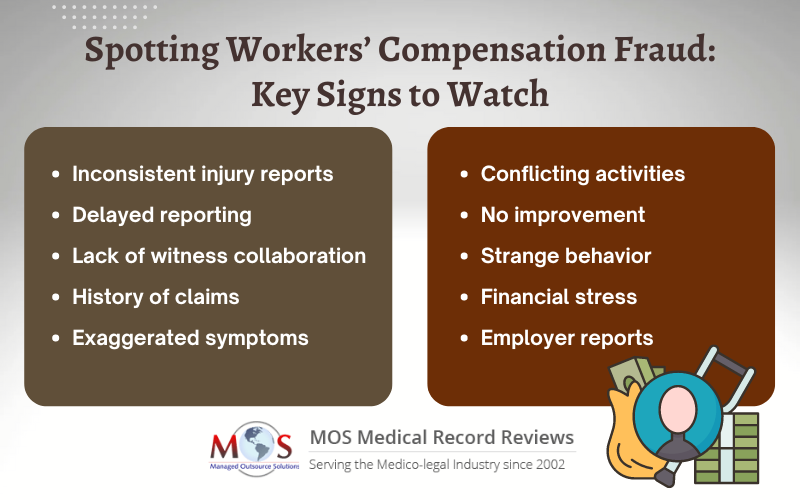Workers’ compensation fraud comprises misleading actions taken by employees, employers, healthcare providers, or other parties to illegally obtain benefits from the workers’ compensation system. This type of fraud can vary, including falsifying the circumstances surrounding an injury, false claims on an injury, overstating the extent of an injury, or providing false credentials to support a claim. Employers may also engage in fraud by underreporting payroll or misclassifying employees to lower insurance premiums. Healthcare providers can commit fraud by billing for services not rendered or by providing unnecessary treatments. Detecting and preventing workers’ compensation fraud helps maintain fairness and trust within the system.
Workers’ compensation attorneys rely heavily on accurate and comprehensive medical records to build strong cases for their clients. Medical record review services play a key role in this process by providing thorough analysis and organization of medical documentation. These services ensure that attorneys have access to all relevant data regarding their clients’ injuries, treatments and medical history, enabling them to effectively support their clients’ rights.
Maximize Workers’ Compensation case success with thorough medical record reviews!
Spotting the Signs of Workers’ Compensation Fraud

Detecting workers’ compensation fraud is crucial for maintaining integrity within the system. Here are some key signs to watch out for:
- Inconsistent injury reports: When injury reports lack consistency or fail to align with medical evidence, it raises red flags regarding the rightfulness of the claim. Attorneys consider medical record review to expose disagreements, and support fair and just outcomes.
- Delayed reporting: Delays in reporting injuries or accidents may indicate attempts to fabricate or exaggerate claims. Fraudsters delay reporting the incident and do not provide any valid explanation for the delay.
- Lack of witness collaboration: If there are no witnesses or if witness accounts don’t confirm the claimant’s story, it raises suspicions. In such cases, attorneys have to find out who first saw the worker after the injury and understand the facts of the injury.
- History of claims: Individuals with a history of frequent claims or prior fraudulent activities are more likely to engage in workers’ compensation fraud. This can raise significant concerns about their credibility and the legality of the current claim.
- Exaggerated symptoms: Claims with exaggerated or inconsistent symptoms such as severe pain levels or disability claims that don’t match medical evidence may indicate fraud. Conflicts between reported symptoms and medical findings, such as diagnostic tests or physician assessments, further highlights potential dishonest activity.
- Conflicting activities: Evidence of the claimant engaging in activities not consistent with their reported injury can be a red flag. Attorneys can use such variations to build a compelling case against fraudulent claims, ensuring that benefits are rightfully allocated and deterring future instances of fraud within the system.
- No improvement: Lack of improvement or prolonged disability without medical justification may suggest fraudulent intent. For instance, if a claimant fails to show any signs of progress or recovery despite receiving adequate medical treatment and rehabilitation, it raises suspicions.
- Strange behavior: Claimants avoiding medical exams, refusing treatment, or exhibiting evasive behavior during investigations may be trying to hide fraud.
- Financial stress: Claimants facing financial difficulties or personal crises may be tempted to commit fraud for monetary gain.
- Employer reports: Employers noticing suspicious behavior or discrepancies in claimant’s activities should report them for further investigation.
It is important for employers to pay attention to the above-mentioned signs of possible fraud, and work closely with their claims adjuster, giving them all the facts to safeguard the system for those who genuinely need support. Any suspected fraud must be reported immediately to the carrier or the appropriate law enforcement authority. By partnering with medical record review services, workers’ compensation attorneys can streamline their workflow, improve the quality of their legal arguments, and ultimately increase the likelihood of favorable outcomes for their clients.
Enhance your legal strategy with in-depth medical record analysis!




